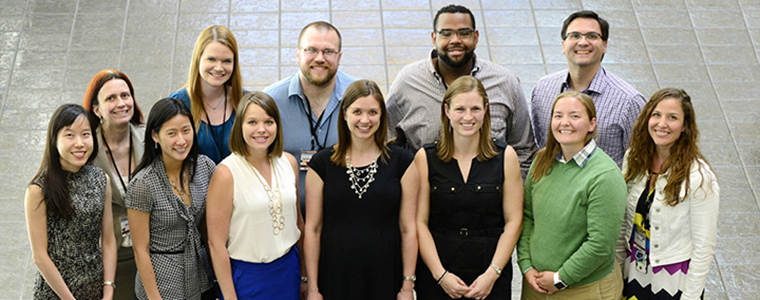Grants Administration
Division of Intramural Research, NIEHS
The following document outlines the policies and procedures governing the application for and administration of grants submitted by employees and fellows within the Division of Intramural Research (DIR). This document pertains to applications funded for any purpose by: 1) the NIH, 2) non-NIH Federal sources, and 3) non- Federal sources, and applies to all investigators and fellows within the DIR.
The objective of this document is to ensure that applicants are fully supported by the administrative units of the DIR responsible for applications and financial management, including the Office of the Scientific Director (OSD) and the Administrative and Research Services Branch (ARSB). Our intention is to maximize the success of applicants in securing grant support, while ensuring that NIEHS conforms to all applicable Federal policies.
The DIR also gathers comprehensive data on grant applications for all members of the DIR, from the application through awards process, to recognize our successes, identify training needs or areas for improvement, and ensure full compliance with NIH regulations.
KEY PLAYERS:
Eligible DIR Investigators: Principal Investigators, IRTA and Visiting Fellows, Senior and Associate Clinical Physicians, Senior Investigators, Staff Scientists and others as approved by the Scientific Director (SD) and the Deputy Scientific Director (DSD).
Deputy Scientific Director (DSD) or delegate: The DSD reviews and approves all applications prior to submission, including renewals, and provides letters of collaboration, support, or commitment when needed.
Financial Oversight: The ARSB is responsible for all budgetary review, planning for and management of funded awards
Submissions of Grant Applications: For fellows, the Office of Fellows’ Career Development (OFCD) will perform electronic submissions requiring grants.gov or other federal electronic system and works with fellows on the preparation of their applications. For DIR investigators, OFCD will also submit applications requiring grants.gov or other federal electronic system. For submissions that don’t require institutional submission, DIR investigators and Fellows submit the application after NIEHS approval.
Submission of Grant Applications and Additional Support: The Office of Technology Transfer (NIEHS OTT) is responsible for review of intellectual property impact and serves as a backup to OFCD for application submission.
Additional Support: The Ethics Office provides clearance of conflict of interest issues, to be consulted as needed.
Additional Approvals: DIR investigators are responsible for determining additional approvals within their labs and branches (such as Branch Chief, Clinical Director, etc.)
NOTE: Fellows can find grant resources & approved funding mechanisms.
- NIH SUPPORTED MECHANISMS:
- NIH Extramural Grants: DIR investigators are not eligible to receive funding from the NIH extramural division except where specifically allowed by the funding announcement. (see eligibility under the funding announcement). With permission by the DSD, DIR investigators are allowed to be unfunded co-investigators or collaborators on extramural grants submitted by extramural investigators. A letter from the DSD confirming Institute support for participation in the grant as part of the investigator’s official duties should be included at the time of grant submission along with the investigator letter of support. Alternatively, the DSD may co-sign the letter of support.
- NIH Intramural Grants: DIR Investigators (and fellows in some cases) are eligible to receive funding from special NIH programs such as the Office of Research on Women’s Health, the NIH Office of Dietary Supplements, and NIH Office of AIDS Research (OAR) etc. Investigators must follow guidance issued by each of these programs.
- NON-NIH, FEDERALLY SUPPORTED PROGRAMS:
- Intramural investigators and fellows may apply for grants from Federal sources as long as the sponsor allows applications from Federal entities, and grant opportunities are openly announced and competitively awarded. Generally, a cover letter must be obtained from the DSD to submit with the application allowing the application preparation and the subsequent work to be conducted as part of their official duties (in the case of employees) and training (in the case of fellows).
- NON-FEDERAL SPONSORS (FOUNDATIONS, INDUSTRY, ETC.)
- Intramural investigators and fellows may apply for grants from private sources as long as the sponsor allows applications from Federal entities, and the grant opportunities are openly announced, and competitively awarded. Approval (and potentially a cover letter) must be obtained from the DSD allowing the application preparation and the subsequent work to be conducted as part of their official duties (in the case of employees) and training (in the case of fellows).
- Investigators and fellows are strongly advised to submit the opportunity announcement or guidelines and a project summary to the NIEHS OTT to determine if intellectual property terms of the award may preclude NIEHS from accepting an award if one is offered.
- Investigators and fellows must ensure that no conflict of interest (COI) exists or if there are conflicts provide a plan for management of this conflict – any questions should be addressed to the Ethics office.
- APPLICATION PROCESS AND SUGGESTED TIMETABLE
- Communication by applicants with all interested DIR parties, well in advance of a submission deadline, will ensure that appropriate planning and approvals occur without undue complications or risk of error and oversight. For individuals who are submitting an application for the first time, appropriate planning will help to ensure the candidate’s chances of success are maximized.
- The following guidance is recommended for all funding opportunities except NIH IRP special programs. For those opportunities follow specific notices from the sponsor.
NOTE: There may be additional timeline requirements from OFCD for fellows.- As early as possible after identifying the potential opportunity:
- Employee – submit announcement guidelines and project summary to OTT and DSD for review and approvals, address potential COI.
- Fellow – meet with OFCD for guidance on grant application policies at LEAST 6-8 months before applying, and to obtain grant templates containing information such as: NIEHS DUNS & other numbers & addresses, a sample budget, sample equipment & facilities, sample RCR language, sample institutional environment, sample institutional letters of support, etc.
- At least one month before the application deadline:
- Obtain boilerplate language regarding current funding support from ARSB & boilerplate information regarding NIEHS DUNS & other numbers & addresses from OFCD.
- For electronic submission, obtain necessary accounts (NIH eRA Commons, DOD eBRAP, etc. If applying through grants.gov, the applicant creates an account and sends their username to OFCD to obtain a grant “Workspace” with prepopulated templates).
- Review budget with ARSB.
- At least 2 weeks before the application deadline.
- For electronic submission, confirm Signing Official information and set a date for the submission process.
- After submission, confirm application receipt.
- If an award is made, notify ASRB and OFCD.
MISCELLANEOUS
- Applications to foreign sources of funding present additional concerns and may require additional review and approvals from NIEHS and NIH. Investigators planning to collaborate on multi-institution grant applications with researchers at foreign institutions must ensure all NIH policies regarding those collaborations are followed. (Guide for NIH Intramural Principal Investigators to Navigate International Interactions and Avoid Inappropriate Foreign Influences on Their Research, November 20, 2018).
- Except for grant opportunities where NIH specifically allows that DIR investigators may receive funding, collaboration and/or support letters submitted to NIH extramural division funding opportunities must include the following language:
The research described in the application will be performed as part of my official duties using resources made available to me by the NIH. No extramural support provided in this grant will be used to support my contribution to the project in this application.








